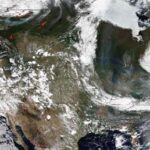Are we ready for the end of uncertainty in hydroclimatic data?
By: Fernando Miralles-Wilhelm
Yes, I confess I was cranky on that Thursday morning.
Maybe it was the infusion of coffee too early in the day, maybe it was that I had not slept too well (jetlag gets me every time, no matter how hard I try to avoid its effects), maybe I was bored, or maybe I was just having one of those days in that my patience was running short. I cannot really tell; but I kept looking at the six people sitting at the podium table (the panelists) while also looking impatiently at the clock in the room, counting the minutes until they had finished making their remarks, and then we could move on to having our discussion.
I was ready for a brawl (a verbal one, I am no street-fighter J).
I was sitting at a room inside the Stockholmsmässan (http://www.stockholmsmassan.se), attending a session at World Water Week 2013 (http://www.worldwaterweek.org). I have been lucky to visit the beautiful city of Stockholm many times to attend this event (http://blogs.iadb.org/cambioclimatico/2011/09/07/semana-mundial-del-agua-2011-como-adaptarnos-al-cambio-climatico/), and I have enjoyed it every time. It gives me a chance to catch up with a multitude of colleagues from around the world, and learn from them the latest work they are doing in trying to solve the multiple problems that affect that precious compound for life: water.
In this particular session I was attending, the panelists kept talking about how we have to deal with climate uncertainty to manage water (in all fairness, this was the topic of the session, http://programme.worldwaterweek.org/event/climate-uncertainty-in-2885). Rainfall uncertainty, temperature uncertainty, how this uncertainty affected policy and decision-making, uncertainty this, uncertainty that, and on and on.
The more and more I heard, the more I thought to myself: are we really STILL having this discussion? For me, it was like hearing (again!) a Boston Red Sox fan (I am one) talking about why we lost the 1986 series against the New York Mets.
I had had enough of that discussion, and now I had had enough of this one too. The panelists finished their remarks, and it was time for questions and discussions. I was pumped up and ready to throw my punch. Here is how it went down.
From my vantage point, this was a discussion we could have had in the 1970s, the 90s, maybe even 10 years ago. But today? With all the advances in satellite remote sensing, climate modeling, data processing power, and fast wireless networks? I think all this exasperation of mine showed when I was finally able to ask my question, because I got back the strangest look back from the panelists (like they were thinking: “is this guy crazy?”), and the responses I got back were very defensive (except for one: Sonja K, thanks for your well thought response!).
The question I asked was: let’s imagine for a few minutes that there is no climate uncertainty! Let’s imagine that every bit of climate information we need to manage water, to make water related decisions, to develop water policy, is available at the tip of our fingers, in real time and with no uncertainty whatsoever. Would these water management problems we were just discussion go away? Is uncertainty really the culprit of our water management problems? What (then) would we REALLY need to manage water better?
Going in, I knew that the answer to the first two questions is NO. So, these were rhetorical, and only served to setup the third question (which was my real question). I further argued that most data (and associated uncertainty) that we need to make water management decisions and policy today was available 10 years ago; and that with the advances being made in science and technology today (we have some of the smartest people in the world working on this 24/7/365), whatever uncertainty still exists, will be gone for all practical purposes within another 10 years.
So, the message I wanted to send to the panelists, and to the rest of those attending the session, was that uncertainty (in climate or hydrologic data) is NOT what is keeping us from managing water better, making better water decisions and policy. It is also not uncertainty in population, land use or other factors for which we have a pretty good handle on current data and future projections. In fact, as I argued, it isn’t uncertainty at all!
The real problem is an institutional and governance one. It is about the way we have organized ourselves to manage water, the regulatory and legal framework we have established, with different flavors around the world, to manage water. These are no trivial matters (in fact, probably much tougher to solve than measuring rainfall by satellites!), so we best spend time on that than arguing about uncertainty (that problem is going way).
To give an example of how far we have come in forgoing uncertainty, you can take a look at publicly available hydroclimate data at the Global Flood Monitoring System (http://flood.umd.edu), where you can find rainfall data for any location in the world, as well as data-derived runoff estimates. This data is available at a temporal resolution of 3 hours, and a spatial resolution of 12 km (with 1-km being developed now). Like I said, all the data you want, anywhere anytime, at the tip of your fingers.
So now that you have this data, and it is available for free, what do you do with it? This has been, and will continue to be, the real challenge in better water management. We better get ready for that day, because it is already here.







